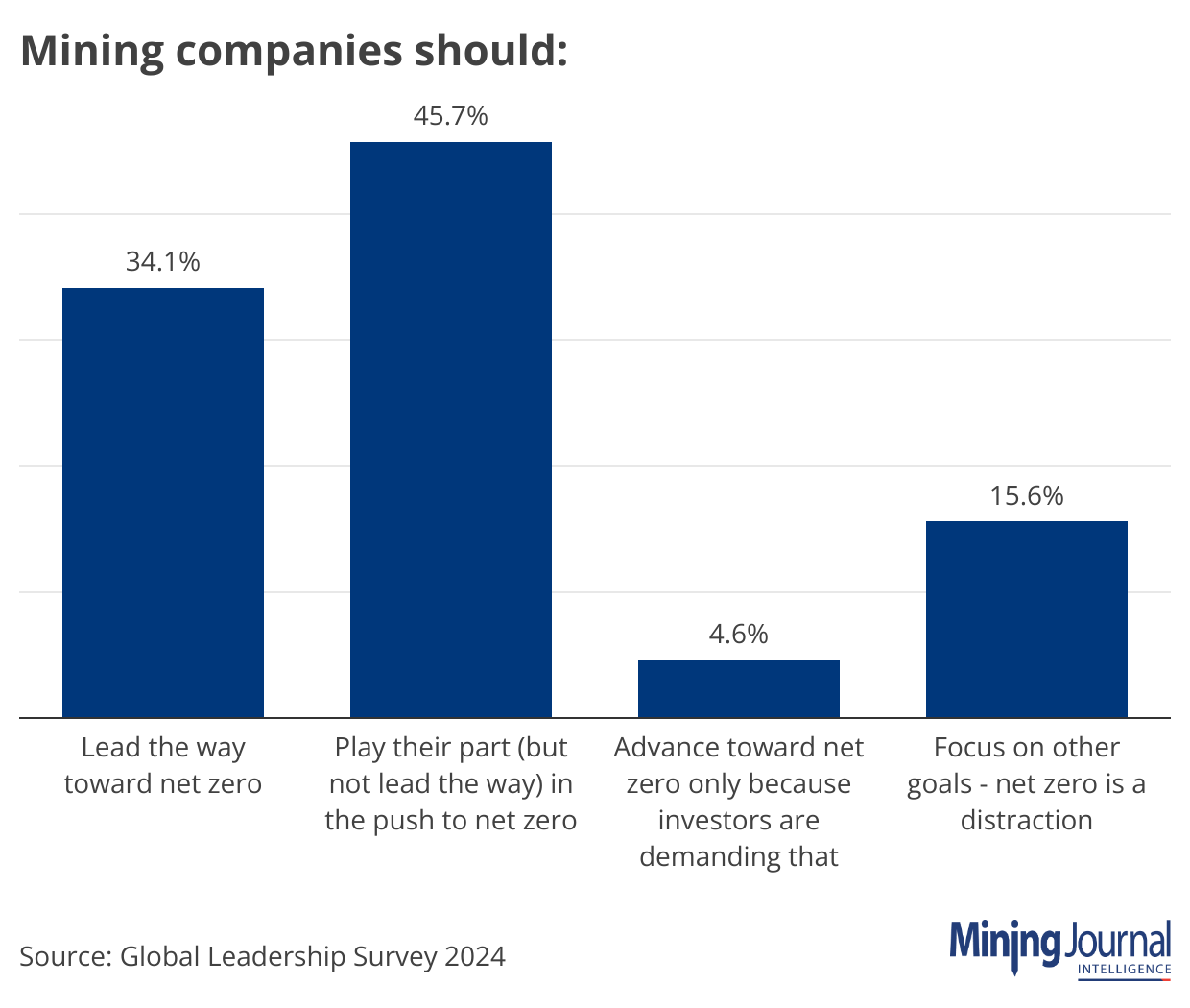The global mining industry remains firmly committed to decarbonisation, new research by Mining Journal Intelligence (MJI) shows, despite suggestions that the sector's focus on ESG issues may be slipping.
MJI's Global Leadership Survey 2024 shows four-fifths (79.8%) of industry professionals believe the industry should at least 'do its bit' in global efforts to cut carbon emissions.
With mining responsible for an estimated 4-7% of global emissions, more than a third (34.1%) of respondents said mining should lead the way toward net zero, with 45.7% saying the industry should play its part (but not lead the way). A further 4.6% of respondents said mining should advance toward net zero but only because investors are demanding it.
While the survey revealed a decarbonisation-sceptical ‘camp' within the sector, the sceptics were a minority. About one in six (15.6%) said net zero was a distraction for mining and that the industry should focus on other priorities.

The survey was completed by 203 professionals, of whom 88.7% were managers or board or executive committee members. Nearly half (47.8%) were from mining or exploration companies, with 43.3% from mining equipment, technology and services (METS) firms. The remainder were investors.
MJI's survey forms a key element of the recently published Global Leadership Report 2024: Net zero, which also features interviews with executives from 17 major mining companies (market cap US$1 billion-plus) and six decarbonisation experts.
Doubts dispelled?
The survey findings show a clear majority of mining professionals support the industry's net zero commitments, despite recent doubts raised about its focus on broader ESG (environment, social and governance) issues.
An apparent reduced emphasis on renewable energy and ‘green mining' at this month's Diggers & Dealers Mining Forum in Kalgoorlie prompted Australian law firm Gilbert + Tobin to ask: "Have we already passed peak ESG in metals and mining?"
Glencore has also opted to retain its coal business, despite pressure from investors relating to the carbon emissions from burning coal. "They [investors] still do recognise that cash is king and that is always the case," CEO Gary Nagle said.
Net zero: A realistic target?
Despite the strong support for decarbonisation, the survey revealed widespread doubts about the industry's ability to meet its targets. Nearly two-thirds of respondents (63.6%) described net zero as an unrealistic goal for mining.
However, nearly all large mining companies have committed to net zero emissions by 2050 or sooner, in line with Paris Agreement goals to limit global warming. Most have also set interim targets, many of around a 30% cut by 2030.
Initial steps taken on the path to net zero by the 17 participating mining companies include securing clean power for operations – with notable successes by Antofagasta and Teck Resources in Chile – and energy efficiency improvements.
Significant challenges ahead include the lack of renewable energy availability in many jurisdictions and the slow rollout of low-emission mining vehicles for open-pit operations.
"While Scope 1 and 2 work for the next 10 years seems relatively straightforward, the path to net zero after that becomes more obscure," Kathleen Quirk, CEO at Freeport-McMoRan, told MJI.
"For example, when will haulage technology and the associated infrastructure be available at scale? What retrofits will be required? How will fleets across the industry change over without significant supply shortages? And how will we plan for that capital? Partnerships are critical in this journey."
The importance of a partnership approach was mirrored by ICMM's director of innovation, Bryony Clear Hill. "It's absolutely vital that we do get there [net zero]. I think it is achievable, but we are one part of an ecosystem and we're going to need everyone to collaborate if we're going to get there," she told the report.
The Global Leadership Report 2024: Net zero is available here and can be accessed for free (along with all MJI reports) by Premium subscribers.


























